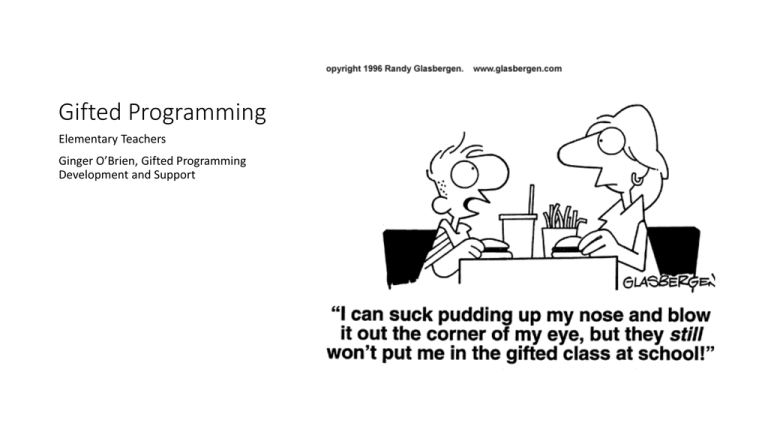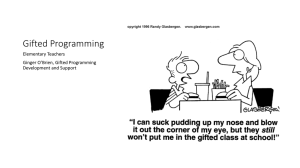gifted support -- elementary teachers powerpoint presentation
advertisement

Gifted Programming Elementary Teachers Ginger O’Brien, Gifted Programming Development and Support According to our Special Education Plan . . . Screening – WJIII: Passage Comprehension, Applied Problems, Academic Knowledge 85th > at or above the percentile in any one of these > collect work samples, present information to ALT and Psych. Ed. Consultant to decide if C-CAT or WISCIV administered Giftedness An unusually advanced degree of general intellectual ability that requires differentiated learning experiences of a depth and breadth beyond those normally provided in the regular school program to satisfy the level of educational potential indicated. Special Education A Guide for Educators 2001 According to Professionally Speaking. . . • Professionally Speaking – Gifted Who is gifted anyway? He fidgets to beat the band but can solve a fourby-four Rubik’s cube in less than five minutes. She goes the extra mile in all her school assignments, even in subjects that bore her mightily. What unites these very different children is that they’re both gifted. Simply put, they’re so smart that they need to be taught differently. “What is the best way to teach gifted children? It all depends on how each child learns best.” (Professionally Speaking, March 2012) Common approaches: • Acceleration – moving ahead • Compacting – assess for mastery – provide other independent learning options • Ability groupings – different groups for different subject areas • Enrichment – opportunities to go deeper and wider into subjects • Withdrawal programs and congregated classrooms – time with intellectual peers We provide a combination of these approaches . . . It’s about differentiated instruction . . . • The Ontario Curriculum indicates what must be assessed. If students have already mastered concepts, we need to provide other learning opportunities. After a pre-assessment, we determine our students’ instructional needs and the result directs our teaching. Characteristics of giftedness: • learn at faster rates • find, solve and act on problems more readily • manipulate abstract ideas and make connections (Van Tassel–Baska, 1988) What is curriculum differentiation for gifted? (according to NSW Dept. of Ed.) • Gifted students need the opportunity to work through the curriculum at a faster pace and need less time on basics and revision. A differentiated curriculum is a program of activities that offers a variety of entry points for students who differ in abilities, knowledge and skills. In a differentiated curriculum teachers offer different approaches to what students learn (content), how students learn (process) and how students demonstrate what they have learned (product). What resources to do we have? • 0.5 Gifted Support Teacher • Public website with links to resources for students, teachers, parents • Congregated learning opportunities for junior/intermediate students • On-line community of learners LDCSB Gifted Web Site Students who are registered in enrichment modules in grades 5, 6, 7 & 8 have access to an on-line community Desire2Learn The vision . . . Create a community for gifted students to give them opportunities to interact with like peers – on line and in person (i.e., consistent group of students participates Grade 5, 6, 7, 8) What about permission to participate? • Permission forms will be posted on D2L so only students who are registered in enrichment modules class lists will have access • (SPST please remind student and Classroom Teacher) • Student downloads form and gets it signed by parent/guardian and submits to Classroom Teacher Questions? • Contact Ginger O’Brien, Gifted Program Development and Support globrien@office.ldcsb.on.ca



